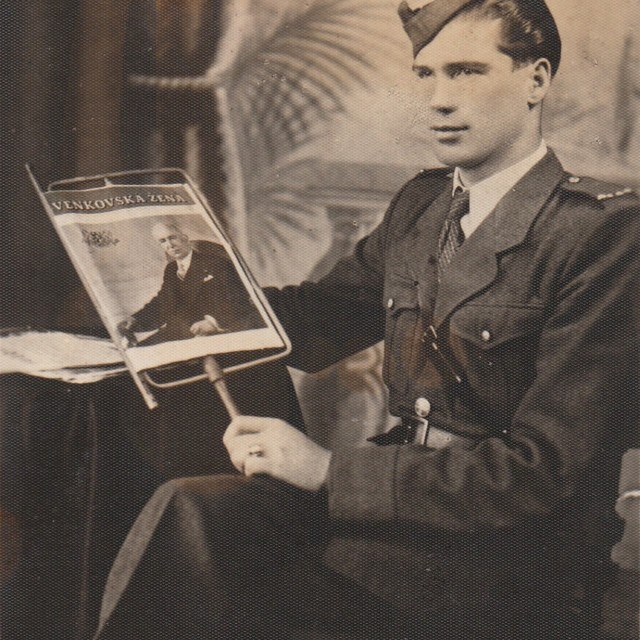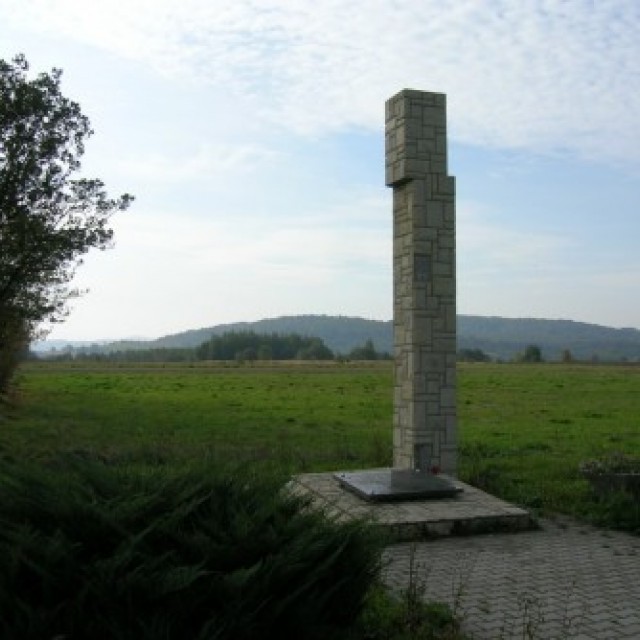I borrowed the shoes from him
In the year 1944, Vladimír Ponikelský was assigned to the artillery regiment after his recruitment at the first Czechoslovak Army Corps in Rovno in Volhynia. He took part in the fighting in Machnówka. The army was in poor condition and ill-equipped, he recalled: “In Machnówka we were stationed next to a big homestead. Whenever the situation was calm or even when it wasn't, I would go for a walk along the stream and explore the area. It was close to our shooting positions. I managed to find a blanket there, it was rather big and on one corner there was shit all over it. So I took the blanket and washed it in the stream so that I could wrap myself in it at night. In the meantime I complained to the person in charge of equipment: ‘Shortly we're going to cross the border and my ass is naked and there are holes in my shoes.’ He made excuses that he didn't have anything because the storehouses were burnt down. But one day I found a dead German as I was walking along the stream. He had these beautiful shoes, newly issued. First, I checked whether he'd wake up, then I ‘borrowed’ the shoes from him. I didn't have to worry about my shoes until the end of the war.”
Hodnocení
Abyste mohli hodnotit musíte se přihlásit!
Trasy
Příběh není součastí žádné trasy.
Komentáře

Vladimír Ponikelský
Vladimír Ponikelský, retired captain, born on November 10th, 1923, is not only a witness but also an active participant of the battles fought by the First Czechoslovakian Army Corps. He entered the forces in Rovno in Volhynia in March 1944 and thus he was one of 12,000 volunteers who entered the Czech army on the east front. His father Václav, brother Rostislav, and uncle joined the army with him. His sister and stepmother stayed on a family farm in Máslenka, which is a village near Dubno where the family was from and where Václav Ponikelský was a mayor. Originally, it was Vladimír Ponikelský's great-grandfather who arrived in Volhynia; his father Václav was born there. The family had a small farm in Máslenka and they even entered the Orthodox church. It was usual then for the Czechs to speak more languages in Volhynia because the area was multinational. There lived the Polish, Ukrainians, Jews, Germans, and Czechs. The national ambitions of the Ukrainians became a threat to the interest of other nationalities which were also threatened by the advance of the German army to Ukraine in 1941. So in 1944, Volhynia was an area where there had been several waves of violence - committed by the Germans and Ukrainian nationalists. But the Soviet Bolsheviks were becoming the major force. Vladimír Ponikelský served in artillery units and was trained in Romania for several weeks. He first participated in real fights during the Battle of the Dukla Pass - first near Krosno, Jaslo, and Machnowka near Dukla and then in the pass which was infamous for the great losses that Czechoslovakian troops suffered. Finally, in May 1945, he and his unit arrived in Prague. At that time he knew that his brother Rostislav had died during the Battle of the Opava nad Ostrava because his tank was hit by a mine. His uncle had also been shot dead by the Germans - it was during the Battle of the Dukla pass when he was in the kitchen. Vladimír Ponikelský and his father decided to stay in Czechoslovakia for good. They settled down in Levonice u Postoloprt where they received a small field with the area of 12 hectares and they started a farm. So Vladimír Ponikelský had to leave the army because of his father, even though he could expect a promising career there. He, like many Czechs from Volhynia who fought on the eastern front, did not want to go back there - the Soviet communists were not preparing a good future for Volhynia. However, the communist did not prepare a good future for him in his new home. He was arrested in 1949 because he did not report a crime. He did not report a friend of his to the police, who, according to the court, committed high treason. During the trial forty people were sued and Vladimír Ponikelský was sent to prison for 10 months. However, before that he had been tortured by secret policemen in Most during a several month-long investigation. He served the rest of his punishment in uranium mines in Jáchymov. After he had left prison he was offered to cooperate with the police several times. Nevertheless, Vladimír Ponikelský refused and did not even join the communist party, although it would have been beneficial for him as a former farmer, now the worker of a cooperative.





